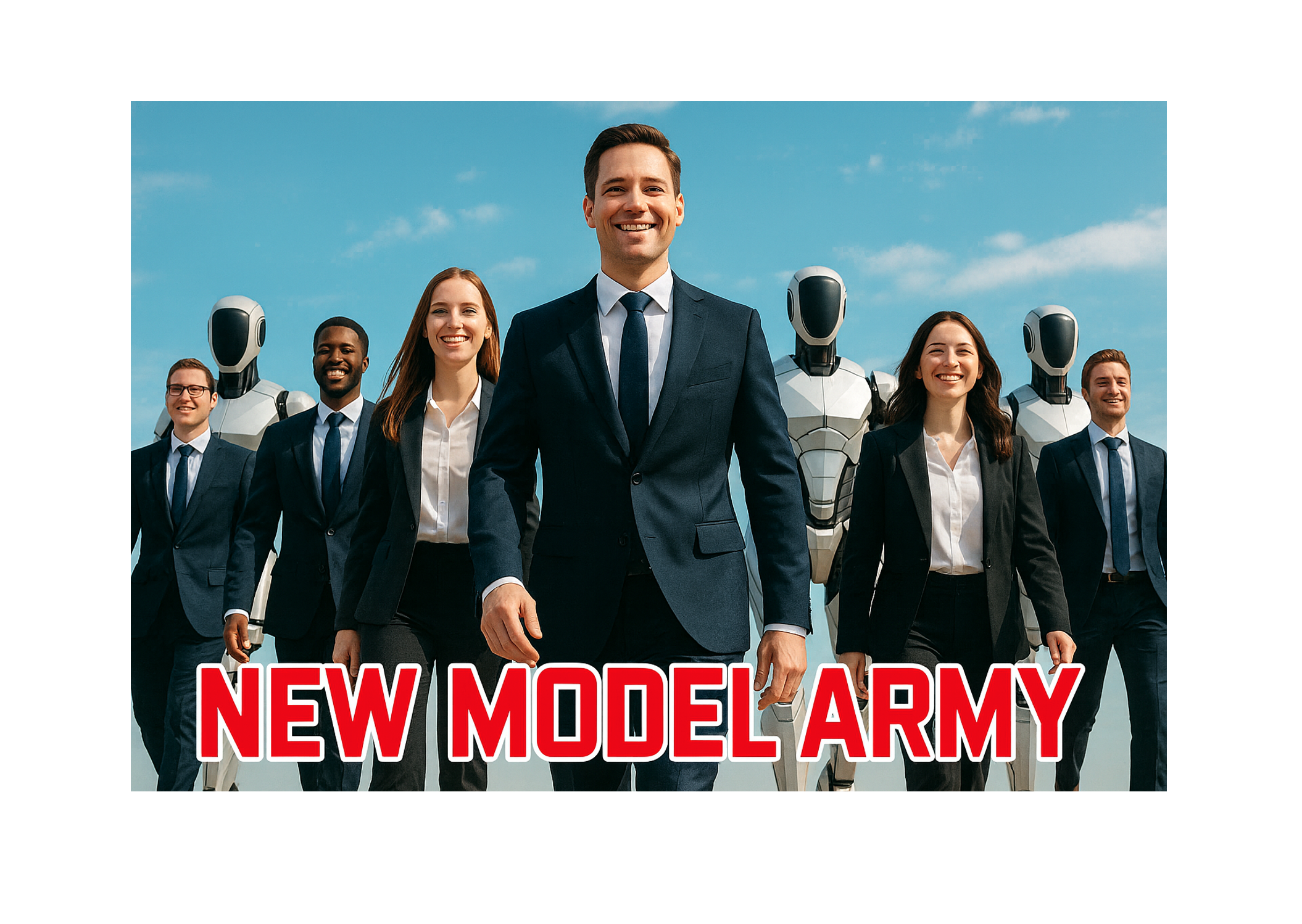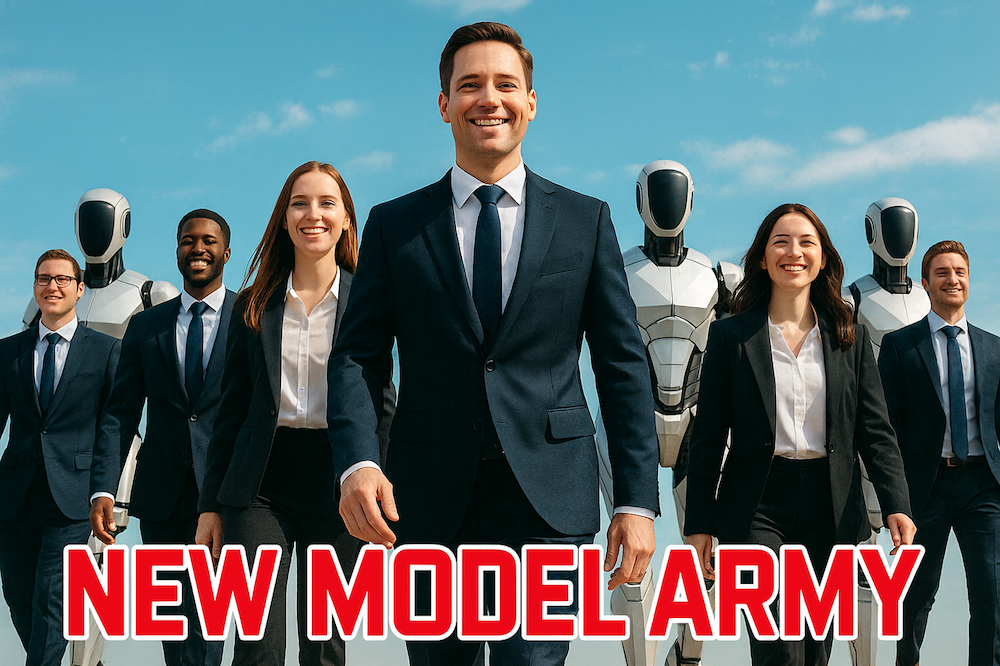
A new type of ‘law firm’ is rapidly appearing and they’re becoming a new model army. Pierson Ferdinand has no junior lawyers, Covenant is both tech company and legal provider, Crosby has a Silicon Valley vibe, Norm AI – backed by Blackstone – has launched an ‘AI Native Law Firm’. And more ‘NewMods’ are coming.
Here’s an overview of what is happening and what it means. First, the members of this new model army. And immediately it should be said, NewMods have a blend of structures, but at heart they all have one thing in common: relying on AI, rather than a pyramid of associates, to do most of the legal labour – and that is the key factor here.
(Note: for the first time at a Legal Innovators conference – on this occasion in New York – we had three members of this NewMod group on stage, speaking alongside much more established law firms. That in itself is a sign of the times.)
Covenant – created by the former GC of WeWork, Jen Berrent, it combines a tech company which receives investment alongside a ‘law firm’, which provides senior lawyer support for private market investors. As Berrent told Artificial Lawyer, if you accept that ‘AI exists’, then how do you build a law firm from scratch? This is their answer.
Crosby – with investors such as Cooley, Bain Capital and Sequoia, this NewMod provides ‘lawyer-assisted AI to review MSAs, DPAs and NDAs in under an hour’. At Legal Innovators New York, Eddie Nasser, a founding member of its legal team, was keen to underline their commitment to quality and deploying human lawyers; they just use AI as much as it makes sense to – and importantly have no structural or economic limitations to being efficient.
Norm AI – this is a legal tech company focused on agentic systems, especially around compliance. They have now launched their own law firm, NormLaw. The company has received $50m from global investment group Blackstone. They explained that they have:
‘Expert AI Supervision – With purpose-built AI agents, Norm Law attorneys audit, review, and apply strategic judgment, and,
Seasoned Builders – With exceptional lawyers and former regulators, Norm Law combines expertise with advanced technology to deliver unparalleled service.’

Pierson Ferdinand – this looks more like a ‘traditional’ law firm from the outside and covers the full range of work you might expect, from M&A to IP and more. But, as Michael Pierson told the audience at LI NY last week, they don’t have junior lawyers, instead they combine senior lawyers and AI to provide a way more economical offering to clients.
Eudia – a legal AI company focused on inhouse, which bought ALSP Johnson Hana, has now built its own law firm in Arizona under the liberal rules there. This allows it to handle regulated legal matters it otherwise could not.
Lex Generalis – this NewMod business is backed by VC and private equity group Anzu Partners, and will focus on offering flat fees as it supports startups and research institutions. In fact, it’s fair to say it grew out of Anzu itself.
And we also have NewMods such as SprintLaw focused on IP and general commercial needs, Garfield which handles small claims, and Three Points which focuses on tech law and other commercial matters with a strong reliance on AI tools such as Legora.
More will no doubt arrive.
What does it mean?
As Artificial Lawyer has been saying since this site started in 2016, there is a fundamental clash between AI-driven efficiency and the traditional law firm model of using a pyramid of human labour to get things done.
Both NewMods and ‘Trads’ (i.e. traditional law firms) want the same things: to provide great legal services and for the owners of those businesses to make a lot of money by doing so. Where things radically differ is ‘inside the factory’, as it were. As noted, the NewMods rely on AI to do the leg work – but they don’t act crazy and think that top quality work can be done yet without lawyers.
You might then say, ‘Well, if they think like Trads, and offer work as good as Trads, then they are Trads.’ And that may appear to be the case if one just looked at the final work product, but if you lift the lid and look inside, then it’s very different.
In most of the above cases:
– time is not the main measure of value.
– AI does as much as it can – and is never held back for economic reasons.
– the senior lawyers are there to ensure the AI’s work is correct and to add to it.
– knowledge gained from working with clients is ‘folded back in’ and in some cases shared directly, to create more value for the client.
– flat fees, scoped fees, fixed and other types of fees are used, because when you stop selling time you can become way more objective.
– there is often a notable decrease in cost and an increase in speed of turnaround.
In short, NewMods give the clients what they want: speed, better prices and ‘better pricing’, and can ensure that the work product is of the highest quality by keeping lawyers fully integrated into the process.
For Trads the problem is this: in the past they were able to build special ALSP units that were ‘add-ons’ to the main model, and thus had little impact. In this case, this is not a ‘low value off-shoot’, this is a new way of doing what they do. And that’s a challenge for traditional law firm labour pyramids.
Much will depend on the clients, if they go for the above NewMods and revenue starts to pour into them at the expense of Trads, then more and more NewMods will arrive in search of market share. Meanwhile, the Trads will have to think deeply about how to accommodate this approach, which will be harder to handle than spinning up a small ALSP, and instead questions the central business model of most law firms.
Artificial Lawyer will continue to track what the NewMods are doing, because ultimately if you accept that ‘AI is the leverage’, then this approach is the model of today.
—
Richard Tromans, Founder, Artificial Lawyer.
Discover more from Artificial Lawyer
Subscribe to get the latest posts sent to your email.